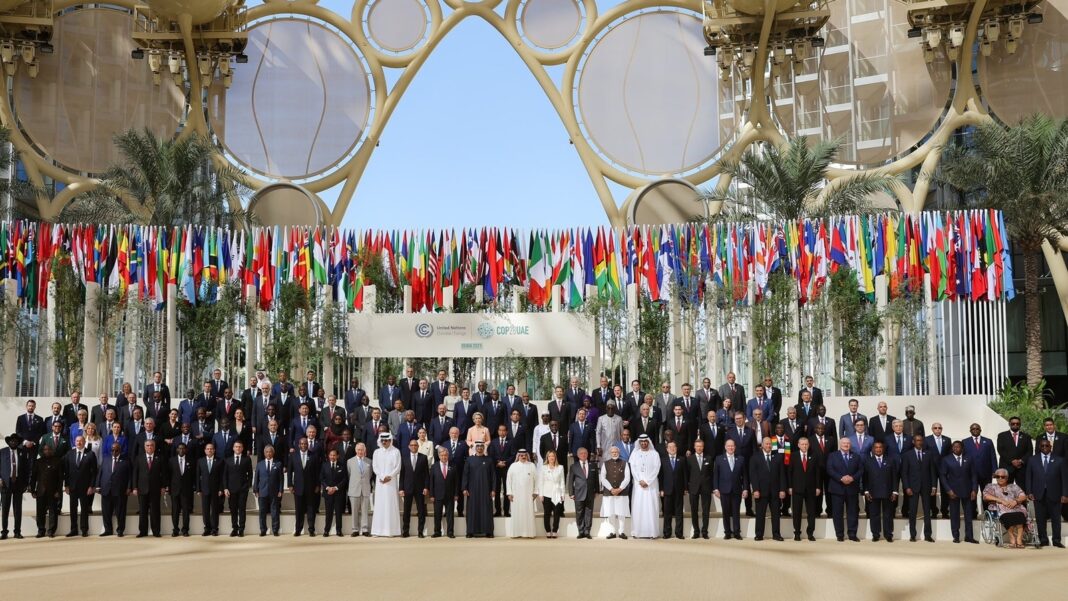The concept of security, essentially tied to the survival of a State continues to remain the most potent one in the 21st century. However, while military security may be the most important one for some states, others view security and survival through different lenses. Pacific Island countries (PICs) for example, view the climate crisis as the most potent challenge in international relations, given the fact that they are not just at risk of more devastating natural disasters, but also of being completely submerged under water if global temperatures increase, and water levels surrounding these island countries rise.
PICs are ecologically fragile and among the most vulnerable to the climate crisis. The climate crisis and climate-sensitive health risks such as vector, food, and waterborne diseases remain significant challenges for PICs. World leaders pose for a photograph at the COP 28 summit in UAE.
Among the notable attendees of the Summit were PM Narendra Modi, President of the UAE and Ruler of Abu Dhabi, Sheikh Mohamed bin Zayed Al Nahyan, UN Secretary General Antonio Gutterus, Uzbekistan President Shavkat Mirziyoyev, Netherlands PM Mark Rutte, Italian Prime Minister Giorgia Meloni and European Union President Ursula von der Leyen. (X/COP 28 UAE) Food and water security in the PICs are also tied to the climate crisis. Livelihoods in the PICs, inextricably tied to health are tied to climate-sensitive diseases such as dengue, malaria, cholera, filariasis, leptospirosis, schistosomiasis, and ciguatera fish poisoning have also been tremendously affected.
Thus, combating climate change is a matter of urgency, particularly for the PICs. Securing climate financing to build resilience to the climate crisis is thus a matter of crucial urgency for the Pacific Islands region. However, PICs face a large climate finance gap, with the average annual spending needs estimated at 6.
5 to 9% of the Gross Domestic Product, or almost $ 1 billion for the region. Even though the Green Climate Fund (GCF), which accelerated transformative climate action in developing countries through a country-owned partnership approach exists, there remain significant challenges for PICs to accessing climate finance. In the PICs, the GCF has not been successfully adapted to meet the unique requirements of the PICs.
For example, the GCF’s approach to the private sector in PICs is not sufficiently coordinated. Also, while the GCF policy landscape has the flexibility to accommodate certain circumstances of the PICs, certain policy and governance issues require Board discussion and decisions. Therefore, at COP28, Dr Sultan Al Jaber, the COP 28 president emphasised that climate finance must be affordable, accessible, and available to developing countries.
Stay tuned with breaking news on HT Channel on Facebook. Join Now There is climate financing architecture in place for Pacific Island countries and the funds include Asia-Pacific Climate Finance Fund (ACLiFF), Asia Development Fund (ADF), Abu Dhabi Fund for Development (ADFD), Adaptation Fund (AF), Adaptation for Small Agriculture Program (ASAP), Climate Change Fund (CCF), Canadian Climate Fund for the Private Sector in Asia II (CFPS II), Climate Investment Funds (CIF) and so on, the fact remains that PICs are still grappling with how to combat the fallouts of climate change. The recipients of these funds include national development banks, financial institutions as well as non-governmental organisations.
However, despite the existence of the plethora of climate funds (CFs) for the PICs, the most frequent problems faced are those around accreditation, monitoring of conditions in the local space ex-ante, instead of monitoring ex-post, low innovation for the scope and processes of projects to be conducted concurrently. There is an urgent need also for exploring the standardisation of access requirements and aligning requirements and standards. The climate crisis also severely impacts fishing and aquamarine resources.
The water resources around the PICs are rich in such resources. As stated by the World Health Organization (WHO) in 2016, for optimal nutrition, Pacific Islanders need to consume approximately 34-37 kgs of fish per annum, based on the WHO recommendation of 0. 7 g protein per kg of body weight daily, and the assumption that fish will need to supply 50% of required protein.
The climate crisis leads to significant changes in the availability and trade of fish products. However, one of the biggest drivers of marine biodiversity loss, as well as the disruption of the ecosystems that keep seas and oceans healthy is industrial-scale fishing. China’s overfishing in the vicinity of the PICs has been a major source of concern.
Oversized fishing trawlers owned by China use gigantic-sized dragnets. Illegal, unreported and unregulated fishing threatens regional food security, and as such is a national security threat for the PICS. In 2020, Palau announced that it intercepted and detained a Chinese fishing vessel and six smaller boats in its territorial waters after it was confirmed that the vessels had entered unlawfully and were fishing sea cucumber.
Victor Remengesau, the director of Palau’s division of marine law and enforcement stated that 225 kg of sea cucumber had been seized. Overfishing not only does not give marine stocks time to recover but also threatens the social and economic well-being of coastal communities, along with impacting global climate. However, unfortunately, at gatherings such as those of COP 28, these vulnerabilities are not discussed.
While financing remains a major issue, what also needs to be discussed to find solutions is the issue of illegal and unregulated fishing and how that threatens the existence of countries that are already at high perils of climate crisis-induced disasters. This article is authored by Sriparna Pathak, associate professor, Chinese Studies and International Relations, Jindal School of International Affairs, OP Jindal Global University, Sonipat. SHARE THIS ARTICLE ON Share this article Share Via Copy Link Security Climate Crisis.
From: hindustantimes
URL: https://www.hindustantimes.com/ht-insight/international-affairs/cop28-climate-crisis-and-survival-of-pacific-island-countries-101702877699269.html



